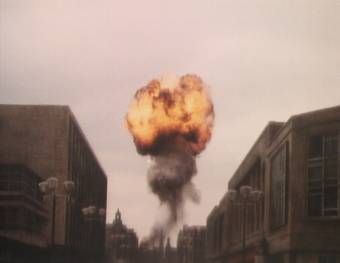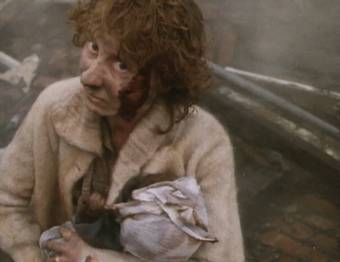| "But
doesn't it scare you, what it might lead to?" |
| "I
know it bloody scares me but there's nowt we can do
about it is there." |
People,
young people especially, no longer seem frightened by the concept
of nuclear war. It's not that they have developed a new found
confidence in atomic weaponry or the powers that wield it, it's just that
we've recently been given new things to worry about. Nowadays
we are encouraged to be paranoid about terrorism and shoe
bombs and chemical weapons and rogue governments and religious
mania. This has effectively steered public attention away
from the fact that several of the world's major powers still
have a considerable stockpile of nuclear weapons, and that
just one of these weapons could lay waste to millions. As western
governments get twitchy about the nuclear intentions of
North Korea and Iran, the issue looks likely to move back
to centre stage in the months to come, especially if, as
seems highly possible, George W. Bush tries to reverse his
popularity slide following the disastrous flooding and resulting humaitarian crisis in New Orleans with
some noisy international sabre rattling. Funny, though,
how it's only governments that Britain and America disapprove
of who build 'weapons of mass destruction', while those
who point the finger have a 'strategic defence initiative'.
I
can't help wondering what filmmaker Peter Watkins made of Threads,
or at least the BBC's decision to fund and screen it. Having
commissioned his harrowing The War Game back in 1965, the corporation chiefs then refused to show it on
the grounds that they considered it propagandist. Its Oscar win for
Best Documentary did little to change their view, and to
this day it has only received a single, almost token TV
screening on 31 July 1985, a full 20 years after it was
made. That Threads, which covers the same
subject from a similarly documentary-influenced viewpoint
and with equally shocking results, was screened to widespread
acclaim is one thing, but to have the BBC fund and show it while the
unofficial ban on Watkins' earlier work was still in place
must have been galling in the extreme. It was to be another
ten months before The War Game was to receive
its belated TV premiere.

There
is little doubt that The War Game was a
major influence on Threads, which takes
a very sobering and sometimes harrowing look at the effects
of a nuclear war on the people of Sheffield. Though open
from the start about its status as drama, it nonetheless
utilises many of the codes and conventions of the documentary
format to ground its action in a very persuasive reality.
Memorable incidents from Watkins' film are recreated here
– the enforced post-war billeting of homeless survivors
with uncooperative house owners, the shooting of looters,
the shell-shocked faces of the injured and traumatised.
Even key extracts from the government's Protect and
Survive information film have also been included here, but this is hardly surprising
given that both films were working from largely the same source
material and with the same purpose in mind. It is in its
dramatic core that Threads differs most
obviously from The War Game, building the
narrative around how the war and its aftermath affect a single
family, connecting us to the events on a personal level
and providing a consistent point for audience identification.
The
intricate and informed script was the work of Barry Hines, who had
previously adapted his own novel A Kestrel for a Knave for Ken Loach's Kes and also worked with
Loach on The Gamekeeper (1980), Looks
and Smiles (1981), The Navigators (2001)* and The Price of Coal (1977). Hines writes almost exclusively from a working-class
perspective, and this is carried over into the structure
and characters of Threads. Those who start
the war, who launch the missiles, who attempt to organise
what remains in the aftermath are never shown on screen, as Hines concentrates
exclusively on the effects on ordinary people.
The only officials shown are those of the local emergency
committee, themselves common folk who quickly discover that they
are out of their depth.
This
is very effectively illustrated in the build-up, with information on the impending
conflict caught in brief glimpses of newspaper headlines
and radio and TV broadcasts as a kitchen-sink family drama
plays out in the foreground. This inevitably recalls Hines'
work with Ken Loach, emphasised by the use of actor Phil
Askham in a supporting role, so memorable in The Gamekeeper and Looks and Smiles.
Like The War Game, Threads also delivers a string of sobering facts and figures through
on-screen graphics and voice-over, its ace-in-the-hole here
being narrator Paul Vaughan, whose voice was at the time
of this film's original broadcast familiar to the viewing public through his
extensive work on the BBC's prestigious factual science
series Horizon.
Where Threads and The War Game walk hand-in-hand is in their sheer power as persuasive
film-making. If Hines provides the structural foundations,
then they are built on to extraordinary effect by director
Mick Jackson, a man who has since been swallowed up by Hollywood,** but who was once one of British TV's most crucial talents,
directing the breezily seductive A Very British
Coup in 1988 and Life
Story in 1987, a film we at Outsider regard
as one of the finest TV movies ever made. Never wasting a shot, Jackson's
potent but economical use of imagery and sometimes razor-sharp
editing (courtesy of Jim Latham and Donna Bickerstaff, the
latter of whom was in the year above me at film school)
communicating the very real horror of the events as
much through suggestion as direct exposure. Individual images
linger long after the film has ended – the nuclear explosion
seen from the streets of Sheffield, the woman who wets herself
in the street in terror, the screaming panic that is cut
off halfway by a second blast, the body of a loved one left
upstairs to rot, the shell-shocked girl staring directly
at the camera cuddling a teddy bear in place of the baby
she has presumably lost, the stark gloom of the nuclear
winter that follows.

The
final third is as dark as any television drama I can readily recall,
as the population is reduced to medieval numbers and the
absolute basics of existence, with even language stripped back to a localised and limited collection of short, monosyllabic
survival phrases. A brief flicker of hope towards the end
soon fades, grimly upturned in a chillingly suggestive finale
that cuts to black just before a scream of horror not just
for personal loss, but for the very future of humankind, if
indeed it has one. You are left stunned, as you should be,
and if the years have distanced us a little from a time
when the events described here seemed frighteningly possible,
the film still contains, tucked away in those half-caught broadcasts
in the first half, an all-too pertinent warning. Here the
flashpoint for nuclear annihilation is not the Cold War
favourite of Berlin, but Iran, the very country that American
and British politicians are at this moment issuing
guarded warnings to regarding their nuclear programme. The
Berlin wall may have fallen, but in too many other respects
the world is still too ready for war.
Even for a film shot
on 16mm for TV in the early 1980s, the transfer here disappoints somewhat.
Sharpness is not at all bad, but contrast varies from shot
to shot, being strong in places but washed out in others. Compression
artefacts come and go, but when they appear they can be very
prominent, not least on the intertitles, areas of what should
be black mutated into a dance of digital noise. Occasionally,
there is the sort of faint banding that suggests that a tape
master was used for this transfer. The bitrate is low throughout.
The
mono soundtrack is adequate, free of pops and noise but lacking
sparkle, it nevertheless showcases the film's sometimes
bone-chilling use of ambient sound well enough. As with The
War Game, there is no incidental music.
Not
a sausage. A missed opportunity.
A
still overpowering piece of apocalyptic political drama, Threads is a showcase for 1980s British television at its most provocative
and powerful, a tightly constructed, breathlessly directed,
and for the most part persuasively performed horror for the
nuclear age, and a worthy successor to Peter Watkins'
groundbreaking The War Game, to which it
is obviously indebted.
Though
it's great to see the film available on DVD it's
a shame a little more care could not have been taken with
the transfer and something offered in the way of extras. The
film should absolutely be seen, but it may be a case of waiting
for the sales to see if the price drops a bit. If the BBC
do Life Story (and somebody should)
then please, please take some time and get it right.
* As script supervisor.
** It started well, with the briskly paced and inventive L.A. Story, but by the mid-nineties Jackson was helming lowbrow action fare like Volcano.
|